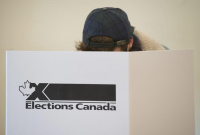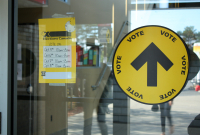Support strong Canadian climate journalism for 2025
Voters will go to the polls on Oct. 21 as originally planned after Canada's chief electoral officer decided not to reschedule voting day even though it falls on a Jewish holiday.
Election day can be no later than Oct. 21 under federal law, which this year coincides with the holiday known as Shemini Atzeret, a day on which Orthodox Jews are not permitted to work, vote or campaign.
Elections Canada had been lobbied to change the date, but decided against it this close to an election, prompting a Federal Court challenge to the decision.
Last week, the court ordered chief electoral officer Stephane Perrault to take a second look at the decision and balance the infringement on the charter rights of affected voters against the objectives of the election law.
Perrault's detailed decision, made public Monday, considered the impact on observant Jews and his mandate "to ensure accessible voting opportunities for all Canadians." But he concluded it would not be in the public interest to reschedule.
Since no change is recommended, the federal cabinet is not required to sign off on Perrault's decision. Under federal law, the chief electoral officer can only make a recommendation to cabinet and cannot take unilateral action.
"This is a difficult situation that directly touches upon the very core values of our democracy," Perrault wrote in his decision.
"I nevertheless believe, when considering the entirety of my statutory mandate, and especially at this time in the electoral calendar, that it is not in the public interest for me to recommend a change to the date of the general election.
"This is not a decision that I make lightly, but with a view to providing the broadest possible range of accessible voting services to the population at large."
Speaking in British Columbia, Prime Minister Justin Trudeau said in French that it was important for Elections Canada decisions be free from political influence.
On Parliament Hill, NDP Leader Jagmeet Singh said the date of the election itself should be in the hands of the chief electoral officer in order to ensure the most number of people possible can participate in a campaign and vote.
In early June, Conservative candidate Chani Aryeh-Bain, who is running in the Toronto riding of Eglinton-Lawrence, and Ira Walfish, a voter in nearby York Centre, argued in Federal Court that the overlap of dates meant that Aryeh-Bain, in particular, wouldn't be able to run a campaign on equal footing to her competitors.
The currently scheduled advance polling days are also problematic, they argued. Three out of four advance voting days — which are held on a Friday, Saturday, Sunday and Monday the week before election day — fall on dates when observant Jews wouldn't be able to vote.
Their concerns drew cross-party concerns, with Liberal incumbents Michael Levitt, who represents York Centre, and Marco Mendicino, who Aryeh-Bain is challenging, siding with the complainants.
Levitt said in a tweet that he was "disappointed" with the decision, while Mendicino separately called it "regrettable." Both wrote they hoped Elections Canada will engage "meaningfully" with affected voters so they have ways to vote.
There was a recommendation that election day be moved to Oct. 28, but Perrault noted that would coincide with municipal elections in Nunavut. He also wrote that 13 school boards hosting polling stations had agreed to make Oct. 21 a professional development day with no classes, and few were willing to make a change to the following week.
He said Elections Canada will continue to reach out to the Jewish community in affected ridings to find other ways to help them vote.
Orthodox Jews are primarily in 36 of 338 federal ridings, most of them in urban areas.
"There is no such thing as a perfect election day, especially in a country as diverse as Canada. There are always Canadians who are unable to vote on election day," Perrault wrote.
"I recognize that maintaining October 21 as election day means that observant Jewish electors will have to vote in one of these alternative ways. They nevertheless have a genuine opportunity to participate in the electoral process."





Comments
On the one hand, you could argue that the Orthodox can vote in the advance polls. On the other hand, that means they have to make up their mind earlier. Some people need every minute of that extra time. I'm not sure why it would be a problem to move voting day by a few days. I don't think the CEO explained that adequately.